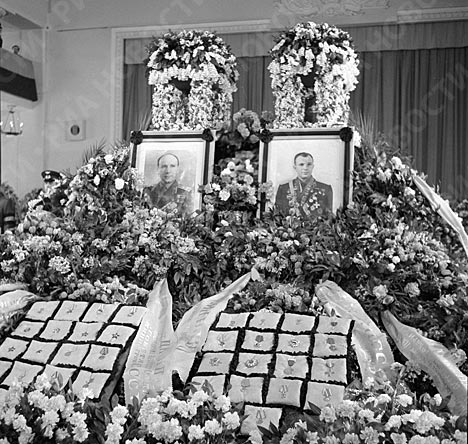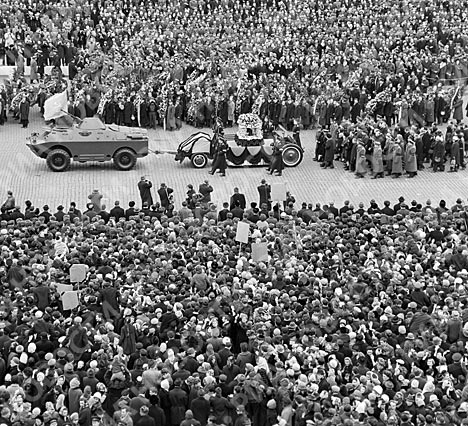Archive for the ‘Space’ Category
Posted by Kris Roman on July 2, 2009
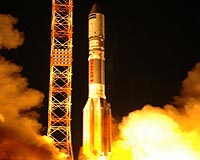 ILS Proton successfully launched the SIRIUS FM-5 satellite into geo-transfer orbit on July 1 from the Baikonur Cosmodrome in Kazakhsta
ILS Proton successfully launched the SIRIUS FM-5 satellite into geo-transfer orbit on July 1 from the Baikonur Cosmodrome in Kazakhsta
ILS International Launch Services (ILS) successfully carried the SIRIUS FM-5 satellite into orbit on an ILS Proton. This was the third commercial mission of the year for ILS and the fifth successful Proton launch of 2009. ILS has launched the entire SIRIUS three-satellite constellation beginning with the first launch in 2000.
The ILS Proton Breeze M launched from Pad 39 at the cosmodrome at 1:10 a.m. local time (3:10 p.m. EDT, 19:10 GMT). After a 9 hour 14 minute mission, the Breeze M successfully released the SIRIUS FM-5 satellite, weighing over 5.8 metric tons, into geo-transfer orbit. This was the 346th launch for the Proton. The Proton Breeze M vehicle is developed and built by Khrunichev Research and Production Space Center of Moscow, Russia’s premier space manufacturer.
Read the rest of this entry »
Posted in Space | Leave a Comment »
Posted by Kris Roman on April 23, 2009
 Maksim Kondratyev
Maksim Kondratyev
Pravda.ru
The launch of the Soyuz-1 spaceship, which took place on April 23, 1967, had a tragic ending for the first time in the history of manned space missions. Cosmonaut Vladimir Komarov died as a result of the tragic landing. Legendary cosmonaut Yuri Gagarin was Komarov’s stand-in in the historic flight. First man in space was aware of the drawbacks of the spaceship and attempted to interfere to save his colleague.
Vladimir Komarov was an experienced cosmonaut: his first flight took place on October 12-13, 1964, together with cosmonauts Konstantin Feoktistov and Boris Yegorov on board the Voskhod spaceship – the world’s first many-seated spaceship. There was a pilot, an engineer and a doctor in the crew. The crew had no spacesuits during the landing and were conducting the first test of the soft landing system.
The spaceship blasted off successfully. The flight lasted for 24 hours and 17 minutes: the ship orbited Earth 16 times. Komarov was awarded the title of the Hero of the Soviet Union and was decorated with the Lenin Order and the Golden Star Medal. He soon became the third Class Cosmonaut and subsequently became an instructor with a group of cosmonauts, the training programs of whom included a manned mission to the Moon.
Read the rest of this entry »
Posted in Space | Leave a Comment »
Posted by Kris Roman on April 15, 2009
 Flight tests of a new-generation Russian space launch vehicle will start in 2010, the director of the Khrunichev State Research and Production Center said on Monday. The Angara rocket, currently under development, is designed to put heavy payloads into orbit. It is mainly planned for launch from the Plesetsk space center, in northwest Russia, which will reduce Moscow’s dependence on Kazakhstan’s Baikonur, the main launch pad for the current generation of Russian rockets.
Flight tests of a new-generation Russian space launch vehicle will start in 2010, the director of the Khrunichev State Research and Production Center said on Monday. The Angara rocket, currently under development, is designed to put heavy payloads into orbit. It is mainly planned for launch from the Plesetsk space center, in northwest Russia, which will reduce Moscow’s dependence on Kazakhstan’s Baikonur, the main launch pad for the current generation of Russian rockets.
“Flight tests are due to start in 2010. In early 2011, a lighter version of Angara is to be launched and by the end of the same year a heavy-class, Angara-5 vehicle is to lift off,” Vladimir Nesterov said in an interview with the Rossiiskaya gazeta daily.
He added that the Angara will not only be used for military but also civilian purposes, specifically to put into orbit satellites as part of the Federal Space Program, as well as joint international space projects.
The new line of rockets will be available in a range of configurations capable of lifting between two and 24.5 metric tons to low-earth orbit.
Nesterov also said the center could, if necessary, develop a new super-heavy-lift rocket capable of putting into orbit payloads of between 45 and 175 tons.
Posted in Space | Leave a Comment »
Posted by Kris Roman on April 12, 2009
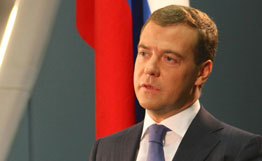 President Dmitry Medvedev has congratulated space and missile industry workers on their professional holiday – Cosmonautics Day, the presidential press service said on Sunday.
President Dmitry Medvedev has congratulated space and missile industry workers on their professional holiday – Cosmonautics Day, the presidential press service said on Sunday.
“The conquest of outer space became one of the brightest and most unforgivable pages of the 20th century history. The flight by Yuri Gagarin on April 12, 1961 opened a new epoch in the civilization’s development,” Medvedev’s message read.
“The first step in outer space was made thanks to the talent of our outstanding designers and the courage of cosmonauts. And we are rightfully proud of the fact that this scientific and technical breakthrough was made precisely in our country,” the message said.
Medvedev said that the development of the space and missile industry remained a strategic priority for Russia.”Russia’s economic successes and competitiveness, the development of science and the country’s security directly depend on the efficiency of its [space and missile industry] work,” Medvedev said.
Posted in Space | Leave a Comment »
Posted by Kris Roman on April 10, 2009
 Russia successfully test launched on Friday a Topol intercontinental ballistic missile to assess the possibility of extending its service life up to 22 years, a spokesman for the Strategic Missile Forces (SMF) said.
Russia successfully test launched on Friday a Topol intercontinental ballistic missile to assess the possibility of extending its service life up to 22 years, a spokesman for the Strategic Missile Forces (SMF) said.
“The dummy warhead has hit a designated target at the Kura testing grounds on the Kamchatka peninsula with the required precision,” Col. Alexander Vovk said.
The missile was in active service from 1987 until 2007, and deployed with the 54th Strategic Missile Division near the town of Teikovo, about 150 miles (240 km) northeast of Moscow.
Read the rest of this entry »
Posted in Space | Leave a Comment »
Posted by Kris Roman on February 28, 2009
russianforces.org
On February 28, 2009 Russia successfully launched a Proton-K rocket from the launch pad No. 24 of the launch complex No. 81 of the Baykonur launch site. The launch took place at 07:10 MSK (04:10 UTC). The rocket, which was equipped with a DM-2 upper stage, deployed the satellite on an intermediate orbit with inclination of about 49 degrees. The satellite is a military communication relay satellite of the Raduga class (also known by their military designation, Globus) that will be eventually deployed in a geosynchronous orbit.
The satellite was given an international designation 2009-010A and the NORAD number 34264. The Space Forces report designated the satellite as “Raduga-1”, but it is not clear whether it is an older Raduga-1 or a newer Raduga-1M (the first satellite of this class, Raduga 1M-1 was launched in December 2007).
The new satellite will join three other active Raduga/Globus satellites – Raduga 1M-1 (32373, launched on 9 December 2007, deployed at 70E), Raduga 1-7 (28194, 27 March 2004, 85E), and Raduga 1-5 (26477, 28 August 2000, 43E).
Posted in Space | Leave a Comment »
Posted by Kris Roman on February 28, 2009
 A Russian military satellite is now in orbit above the Earth after being launched with a Proton-K heavy carrier rocket Saturday, an official says.
A Russian military satellite is now in orbit above the Earth after being launched with a Proton-K heavy carrier rocket Saturday, an official says.
A Space Forces spokesman, Lt. Col. Alexei Zolotukhin, said the satellite successfully separated from the Russian rocket after being launched from the Baikonur space center, RIA Novosti reported.
“The separation of the satellite from the upper stage took place in a normal mode,” Zolotukhin said.
Read the rest of this entry »
Posted in Space | Leave a Comment »
Posted by Kris Roman on February 12, 2009
 Roscosmos is planning to carry out a total of 39 launches from the Baikonur and Plesetsk space centers this year. Russia rents Baikonur from Kazakhstan. The Plesetsk space center is in northwest Russia.
Roscosmos is planning to carry out a total of 39 launches from the Baikonur and Plesetsk space centers this year. Russia rents Baikonur from Kazakhstan. The Plesetsk space center is in northwest Russia.
A Proton-M rocket has successfully orbited two new Russian Express-series communications satellites, a Russian federal space agency official said on Wednesday.
The rocket blasted off at 3:03 a.m. Moscow time (00:03 GMT) from the Baikonur space center in Kazakhstan and put the satellites into orbit as previously scheduled at 12:29 p.m. (09:29 GMT).
Anatoly Shilov, the head of Roscomos Space Communication and Ground Control Complexes department, said that “the task of putting the satellites into orbit has been accomplished.”
He also said the simultaneous orbiting by Proton of two satellites of this type was an historic event. The total weight of the two satellites is 3,700 kg (8.114 lbs).
Read the rest of this entry »
Posted in Space | Leave a Comment »
Posted by Kris Roman on September 23, 2008
 RIA Novosti
RIA Novosti
Russia is negotiating with Cuba and Venezuela on the joint use of Russia’s Glonass navigation satellites, the head of the federal space agency said on Tuesday.
“I have just returned from a working visit to Cuba. They are very interested in cooperating with us in the use of the Glonass system, which will cover the globe by 2010,” Roscosmos chief Anatoly Perminov told reporters in Moscow.
He said Moscow and Havana are working on a space cooperation agreement and have considered ways of jointly using earth remote sensing satellites.
Russia has previously said it intends to share its space technology with Cuba, and has begun discussions on building a space center in the country.
Read the rest of this entry »
Posted in Space | Leave a Comment »
Posted by Kris Roman on September 17, 2008
 Russia intends to share its space technology with Cuba, and has begun discussions on building a space center in the country, the Russian space agency said on Wednesday.
Russia intends to share its space technology with Cuba, and has begun discussions on building a space center in the country, the Russian space agency said on Wednesday.
Roscosmos chief Anatoly Perminov, on a tour of Latin America as part of a delegation led by Deputy Prime Minister Igor Sechin, said the two countries were working on a space cooperation agreement and had considered ways of jointly using earth remote sensing satellites and space-based telecommunication systems.
Discussions are also underway on Cuba’s use of the Glonass satellite navigation system, and on the space center.
“We have tentatively discussed the possibility of assisting Cuba to build its own space center,” the official said.
He said Cuban specialists would soon visit Russia to be shown state-of-the-art space technology and equipment.
Posted in Russia & Cuba, Space | Leave a Comment »
Posted by Kris Roman on September 11, 2008
RIA Novosti political commentator Andrei Kislyakov
 Russian space launch vehicles are winning even more popularity with potential customers, as domestic engine developers have managed to create a versatile re-useable liquid-propellant engine, bringing to life an old dream of the world’s rocket engineers.
Russian space launch vehicles are winning even more popularity with potential customers, as domestic engine developers have managed to create a versatile re-useable liquid-propellant engine, bringing to life an old dream of the world’s rocket engineers.
The Energomash Science and Production Association has developed the new RD-191 rocket engine, meant to equip Angara advanced carrier rockets, ready for mass production.
Why is this development unique? The high cost of putting a payload into space has always been a headache for launch customers. Huge and expensive multistage rockets are burnt up in just one launch. For decades Russian and Western engine building specialists have been wrestling with the problem of developing a re-useable rocket engine which could be brought back to Earth for further use after having worked its portion of flight.
Read the rest of this entry »
Posted in Space | Leave a Comment »
Posted by Kris Roman on August 23, 2008
The Russian space agency has sealed a deal with a private investor to build a Soyuz spacecraft specially for tourist hire and operational in 2011, a statement said Wednesday.
“We have concluded an agreement with an investor to begin financing such a Soyuz vessel with an anticipated launch date of 2011,” the Roskosmos website stated.

The craft, piloted by a professional astronaut, is designed to carry two so-called space adventurers.
Quizzed by AFP, a Roskosmos spokesman refused to identify the investor despite the agency having signed a deal in June with private American company Space Adventures for a commercial flight to the International Space Station.
Read the rest of this entry »
Posted in Space | Leave a Comment »
Posted by Kris Roman on July 16, 2008
Two Russian cosmonauts at the International Space Station spent six hours in space Wednesday to retrieve an explosive bolt believed the cause of the Soyuz spacecraft’s dangerously high-speed descent and landing on two recent missions, NASA said.
While US flight engineer Greg Chamitoff monitored the spacewalk from inside the Soyuz capsule, ISS Commander Sergei Volkov and Flight Engineer Oleg Kononenko attached themselves to the Strela hand-powered crane outside the ISS and Volkov was maneuvered to the Soyuz.
Read the rest of this entry »
Posted in Space | Leave a Comment »
Posted by Kris Roman on July 16, 2008
Yury Zaitsev is an expert with the Russian Academy of Sciences’ Space Research Institute.

Under a stage-by-stage national program for studying Mars, the Phobos-Grunt automatic probe will be launched in October 2009. This cutting edge modular spacecraft costs just 1.5 billion rubles ($64.4 million).
by Yury Zaitsev
Moscow (RIA Novosti) Jul 15, 2008
On July 7 and July 12, 1988, the Soviet Union launched two space probes, Phobos-1 and Phobos-2, to study the surface and atmosphere of Mars and its moons, Phobos, named after the Greek word for Fear, and Deimos, Terror.
Both spacecraft were to have conducted studies of the interplanetary environment en route to Mars, take observations of the Sun and survey the plasma environment around the Red Planet.
The Phobos craft featured state-of-the-art scientific equipment developed by 14 countries and the European Space Agency (ESA).
On July 7 and July 12, 1988, the Soviet Union launched two space probes, Phobos-1 and Phobos-2, to study the surface and atmosphere of Mars and its moons, Phobos, named after the Greek word for Fear, and Deimos, Terror.
Both spacecraft were to have conducted studies of the interplanetary environment en route to Mars, take observations of the Sun and survey the plasma environment around the Red Planet.
The Phobos craft featured state-of-the-art scientific equipment developed by 14 countries and the European Space Agency (ESA).
Phobos-1 operated without a hitch until a scheduled communications session on September 2, 1988 failed to occur. Contact was never reestablished. The failure has since been traced to an error in software uploaded on August 29-30 that deactivated the craft’s attitude thrusters.
Read the rest of this entry »
Posted in Space | Leave a Comment »
Posted by Kris Roman on July 11, 2008
Two Russian astronauts aboard the International Space Station have made a daring spacewalk to repair their Soyuz descent capsule, Russian mission control said on Friday.
Sergei Volkov and Oleg Kononenko managed to remove an explosive bolt from the capsule, one of 10 used to separate two parts of the module during reentry, fixing a problem that had led to rough landings for two previous crews.
Russian engineers believed that the bolt had failed to fire during previous descents.
Volkov and Kononenko put the bolt, which could have blown their hands off, into an onboard blast-proof container. “It is in!” one of the Russians called out.
The astronauts’ landing scheduled for this October should now go smoothly.
Posted in Space | Leave a Comment »
Posted by Kris Roman on July 10, 2008
A Russian Rokot carrier rocket with three military satellites and one civilian satellite has been successfully launched from the Plesetsk space center in northwest Russia, the Russian Space Forces said on Friday.

The Rokot launch vehicle, developed by the state-run Khrunichev Center, is a modification of the RS-18 (SS-19 Mod.1 Stiletto) two-stage ballistic missile that is being decommissioned from Russia’s Strategic Missile Forces.
The rocket is designed to put spacecraft weighing less than two tons into near-earth orbits.
Read the rest of this entry »
Posted in Space | Leave a Comment »
Posted by Kris Roman on June 16, 2008
Forty-five years ago today, Soviet cosmonaut Valentina Tereshkova became the first woman to make a journey into space.
Her flight aboard the Vostok 6 spacecraft lasted for two days, 22 hours and 50 minutes. She orbited the Earth 48 times. She was 26 years old at the time.
Tereshkova was selected ahead of 400 other applicants and went through a vigorous training program before blasting off on June 16, 1963.
Her historic flight was greeted as a propaganda coup for the U.S.S.R., and after returning to Earth, Tereshkova was given many of the Soviet Union’s highest awards.
She never made a second trip into space, but has said that she would like one day to fly to Mars, even if it meant a one-way trip. “I am ready to fly there without coming back,” she told Russia’s Komsomolskaya Pravda newspaper in 2007 on the occasion of her 70th birthday.
Tereshkova has a crater on the far side of the moon named after her.
Posted in Space | Leave a Comment »
Posted by Kris Roman on May 27, 2008
Russian and European space agencies are due to discuss the joint development of a manned spacecraft at a Berlin air show taking place May 27 to June 1, the head of Roscosmos said on Tuesday.
A spokesman for the Federal Space Agency (Roscosmos) said earlier that it had agreed with the European Space Agency (ESA) to jointly build a manned spacecraft for flights to near-Earth orbits and the Moon.
Anatoly Perminov said further talks would focus on areas of responsibility for the agencies.
“Concerning the joint construction of the system, we have signed the documents, and now we will discuss the issue of dividing responsibilities for developing elements of the new spacecraft,” Anatoly Perminov said.
He went on to say that once responsibilities had been settled, funding and commitments at the level of production facilities would be considered in detail.
“ESA head Jean-Jacques Dordain is coming to Berlin. As a separate issue we will consider the creation of a future transportation system. It is very important to us, and we will continue the work right here, at the exhibition,” he said.
He said that flight tests of the joint craft were due to start in 2015, with the maiden launch to follow in 2018.
Perminov also said that Russia would be responsible for developing the transport capsule, while Europe would build the service module and engines for the new vehicle. RSC-Energia, a leading Russian spacecraft maker, will be responsible for project integration.
Posted in Space | Leave a Comment »
Posted by Kris Roman on May 6, 2008

Russia should not only be involved in orbiting foreign-made satellites and payloads but promote its hi-tech developments and services, President Vladimir Putin said Friday. “We need to significantly expand our presence on the global market for space products and services,” he said. He said an effective space program could become a significant factor in innovative economic development, calling for new ambitious space projects to be implemented.
Putin said it was necessary to begin financing the Vostochny space center in Russia’s Far East this year and urged its construction to be speeded up.
Last November President Putin signed a decree to construct a new space center, named Vostochny, in the Amur Region.
“We must begin [the construction] now. Finances for its construction must be allocated this year,” he said.
Russia currently uses two launch sites for space carrier rockets and ballistic missiles tests: the Baikonur space center in the Central Asian Republic of Kazakhstan, which it has leased since the collapse of the Soviet Union, and the Plesetsk space center in northwest Russia.
Russia’s Deputy Prime Minister Sergei Ivanov, who oversees Russia’s military-industrial complex, said last year that construction could take about 10 years.
Russia plans to launch its first spacecraft from Vostochny in 2015, and by 2018 to commence manned space flights from the new site.
Putin has also instructed the government to prepare proposals to upgrade the country’s rocket and space sector, the director of the Federal Space Agency (Roscosmos) said.
“The president has given [the government] 10 days to submit proposals on modernizing the rocket and space industry as a whole,” Anatoly Perminov said.
Posted in Space | Leave a Comment »
Posted by Kris Roman on May 6, 2008
The Russian Federal Space Agency supports space tourism as long as the activity doesn’t interfere with its operations, an agency official said.Vitaly Davydov deputy head of the agency, called Roskosmos, said if space tourists on board Russia’s Suyoz spacecraft do not interfere with the International Space Station, he has no opposition, ITAR-TASS reported Saturday.
Currently, anyone wanting to take a trip into outer space must pay millions of dollars for the honor then complete required training at the Cosmonaut Training Center.
The costs associated with the trip do not include the actual cost of the Soyuz craft and would-be space travelers are encouraged to pool their money to buy a space vehicle, ITAR-TASS said.
Each of the Russian spacecrafts can hold three people with one seat automatically reserved for a pilot. Additional spacecraft can be constructed in Russia for a fee to allow additional tourists into space, the Russian news agency said.
Posted in Space | Leave a Comment »
Posted by Kris Roman on May 6, 2008

The number of spacecraft to be launched from the Baikonur space center in Kazakhstan will increase 33%, year-on-year, in 2008 to a total of 28, the local mayor said on Tuesday. Baikonur, built in Kazakhstan in the 1950s, was first leased by Russia from Kazakhstan under an agreement signed in 1994 after the collapse of the Soviet Union. Russian officials have repeatedly said Russia will continue to use the Baikonur launch site until at least 2050.
Alexander Mezentsev, the mayor of Baikonur, told a news conference that Russia launched a total of 21 carrier rockets from the site in 2007.
At present, the two countries are working to build a space complex at Baikonur, Baiterek, to launch Angara carrier rockets capable of delivering 26 metric tons of payload into low-Earth orbits. The project is being implemented on a parity basis and enjoys tax, customs and other privileges.
Kazakhstan and Russia have reportedly each allocated $223 million for the construction of the Baiterek launch site under a 2004 agreement.
“We have prepared the documentation and developed technical requirements [for the project], and all that’s left is to start construction,” Mezentsev said without revealing any specific details.
Posted in Space | Leave a Comment »
Posted by Kris Roman on April 30, 2008

The number of spacecraft to be launched from the Baikonur space center in Kazakhstan will increase 33%, year-on-year, in 2008 to a total of 28, the local mayor said on Tuesday. Baikonur, built in Kazakhstan in the 1950s, was first leased by Russia from Kazakhstan under an agreement signed in 1994 after the collapse of the Soviet Union. Russian officials have repeatedly said Russia will continue to use the Baikonur launch site until at least 2050.
Alexander Mezentsev, the mayor of Baikonur, told a news conference that Russia launched a total of 21 carrier rockets from the site in 2007.
At present, the two countries are working to build a space complex at Baikonur, Baiterek, to launch Angara carrier rockets capable of delivering 26 metric tons of payload into low-Earth orbits. The project is being implemented on a parity basis and enjoys tax, customs and other privileges.
Kazakhstan and Russia have reportedly each allocated $223 million for the construction of the Baiterek launch site under a 2004 agreement.
“We have prepared the documentation and developed technical requirements [for the project], and all that’s left is to start construction,” Mezentsev said without revealing any specific details.
Posted in Space | Leave a Comment »
Posted by Kris Roman on April 30, 2008

Russia’ Progress design and production center is developing a new Bion-M biosatellite for scientific and applied research in space biology and medicine, a spokesman for the center said on Tuesday. He said the new Bion-M being developed by the Samara-based company (European Russia) will be capable of “spending around six months in orbit compared to the current 14 days.”
He also said a more advanced engine will allow the new research craft to reach a higher orbit of 400-500 km compared with 200-300 km.
The first Bion-M is scheduled for launch in 2010 with the second to follow three years later.
Experts say that the scientific data obtained through Bion-M research will extend the time humans can stay in space by up to two or three years.
A total of 11 Bions have been launched since 1973 with over 37 kinds of biological species on board, including single-cell organisms, plants, rats, tortoises and monkeys.
Posted in Space | Leave a Comment »
Posted by Kris Roman on April 27, 2008
A Russian carrier rocket has delivered the second satellite for Europe’s Galileo navigation system into orbit, Russia’s Space Agency (Roscosmos) said on Sunday.
The experimental satellite, Giove-B, was put into orbit by a Soyuz carrier rocket launched from the Baikonur space center in Kazakhstan in the early hours on Sunday, Roscosmos said.
“The foreign satellite separated from the Russian Fregat acceleration unit at the designated time and the space vehicle was transferred to the customer for control,” Roscosmos said.
The Galileo new positioning and communications system will eventually comprise 30 satellites and is expected to become operational from 2013.
Galileo will be Europe’s own global navigation satellite system, providing highly accurate global positioning service under civilian control. It will operate along with Russia’s GLONASS (global navigation satellite system) and the U.S. GPS (Global Positioning System).
Posted in Space | Leave a Comment »
Posted by Kris Roman on April 14, 2008
Flight tests of a new-generation Russian space launch vehicle will start in 2010, the director of the Khrunichev State Research and Production Center said on Monday.
The Angara rocket, currently under development, is designed to put heavy payloads into orbit. It is mainly planned for launch from the Plesetsk space center, in northwest Russia, which will reduce Moscow’s dependence on Kazakhstan’s Baikonur, the main launch pad for the current generation of Russian rockets.
“Flight tests are due to start in 2010. In early 2011, a lighter version of Angara is to be launched and by the end of the same year a heavy-class, Angara-5 vehicle is to lift off,” Vladimir Nesterov said in an interview with the Rossiiskaya gazeta daily.
He added that the Angara will not only be used for military but also civilian purposes, specifically to put into orbit satellites as part of the Federal Space Program, as well as joint international space projects.
The new line of rockets will be available in a range of configurations capable of lifting between two and 24.5 metric tons to low-earth orbit.
Nesterov also said the center could, if necessary, develop a new super-heavy-lift rocket capable of putting into orbit payloads of between 45 and 175 tons.
Posted in Space | Leave a Comment »
Posted by Kris Roman on April 14, 2008
 Laika was launched into space on November 3, 1957 and died a few hours later from overheating.
Laika was launched into space on November 3, 1957 and died a few hours later from overheating.
A bronze monument to a former street dog called Laika, which was the first living creature in space and paved the way for manned flights, was unveiled in northwest Moscow on Friday. The monument, erected a day before Russia’s Cosmonautics Day celebrated on April 12, is a two-meter (6.5 feet) high space rocket with Laika proudly standing on top.
The three-year-old mongrel, originally named Kudryavka or ‘little curly-haired one,’ was selected from an animal shelter to become the first living passenger to fly on the Soviet spacecraft Sputnik 2.
Read the rest of this entry »
Posted in Space | Leave a Comment »
Posted by Kris Roman on April 14, 2008
ussia should not only be involved in orbiting foreign-made satellites and payloads but promote its hi-tech developments and services, President Vladimir Putin said Friday. “We need to significantly expand our presence on the global market for space products and services,” he said. He said an effective space program could become a significant factor in innovative economic development, calling for new ambitious space projects to be implemented.
Putin said it was necessary to begin financing the Vostochny space center in Russia’s Far East this year and urged its construction to be speeded up.
Last November President Putin signed a decree to construct a new space center, named Vostochny, in the Amur Region.
“We must begin [the construction] now. Finances for its construction must be allocated this year,” he said.
Read the rest of this entry »
Posted in Space | Leave a Comment »
Posted by Kris Roman on April 14, 2008
A bronze monument to a former street dog called Laika, which was the first living creature in space and paved the way for manned flights, was unveiled in northwest Moscow on Friday. The monument, erected a day before Russia’s Cosmonautics Day celebrated on April 12, is a two-meter (6.5 feet) high space rocket with Laika proudly standing on top.
The three-year-old mongrel, originally named Kudryavka or ‘little curly-haired one,’ was selected from an animal shelter to become the first living passenger to fly on the Soviet spacecraft Sputnik 2.
Laika was launched into space on November 3, 1957 and died a few hours later from overheating. Officials said she died due to a lack of oxygen, but the true cause of death was only made public in October 2002.
The experiment, which marked its 50th anniversary last year, paved the way for human spaceflight and provided scientists with information on how living organisms become accustomed to space environments.
At the unveiling ceremony the head of the Institute of military medicine, Igor Ushakov, said: “I’m looking at the monument and indeed recognize Laika. She is glancing at the house where the pre-flight preparations and training took place.”
Three years after Laika’s death her successors, Belka and Strelka, went into space aboard Sputnik 5 safely returning to Earth.
Russia celebrates Cosmonautics Day on April 12 in honor of the historic first manned space flight made by Soviet cosmonaut Yuri Gagarin in 1961.
Posted in Space | Leave a Comment »
Posted by Kris Roman on April 11, 2008
A bronze monument to a former street dog called Laika, which was the first living creature in space and paved the way for manned flights, was unveiled in northwest Moscow on Friday.
The monument, erected a day before Russia’s Cosmonautics Day celebrated on April 12, is a two-meter (6.5 feet) high space rocket with Laika proudly standing on top.
The three-year-old mongrel, originally named Kudryavka or ‘little curly-haired one,’ was selected from an animal shelter to become the first living passenger to fly on the Soviet spacecraft Sputnik 2.
Laika was launched into space on November 3, 1957 and died a few hours later from overheating. Officials said she died due to a lack of oxygen, but the true cause of death was only made public in October 2002.
The experiment, which marked its 50th anniversary last year, paved the way forhuman spaceflight and provided scientists with information on how living organisms become accustomed to space environments.
At the unveiling ceremony the head of the Institute of military medicine, Igor Ushakov, said: “I’m looking at the monument and indeed recognize Laika. She is glancing at the house where the pre-flight preparations and training took place.”
Three years after Laika’s death her successors, Belka and Strelka, went into space aboard Sputnik 5 safely returning to Earth.
Russia celebrates Cosmonautics Day on April 12 in honor of the historic first manned space flight made by Soviet cosmonaut Yuri Gagarin in 1961.
Posted in Space | Leave a Comment »
Posted by Kris Roman on April 1, 2008

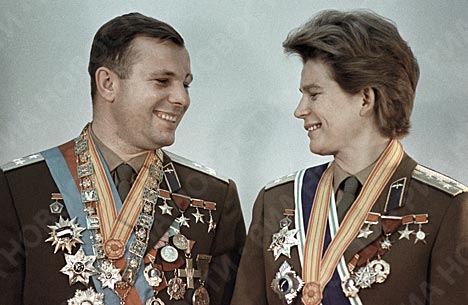
Yuri Gagarin (first man in space) & Valentina Tereshkova (first woman in space)
First man and first woman in space were Russian ! 
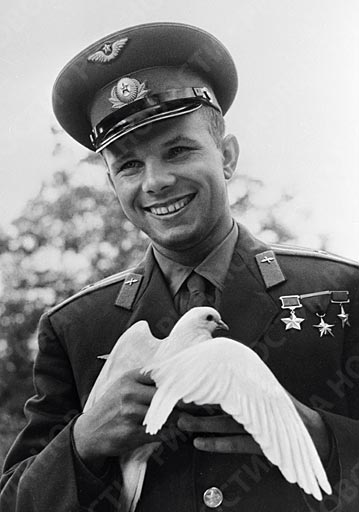
Posted in Space | Leave a Comment »
Posted by Kris Roman on March 30, 2008
Posted in Space | Leave a Comment »
Posted by Kris Roman on February 28, 2008
A shepherd in Russia’s southwestern Siberian Altai Republic is to seek damages from the Russian space agency Roskosmos over a fragment of rocket that fell into his yard on February 5. The incident occurred after the launch of a Proton-M carrier rocket from the Baikonur space center leased by Russia in nearby Kazakhstan.Although the shepherd was not physically harmed, he is seeking moral damages. The three-and-a-half-meter (11 foot) long fragment of rocket fell several meters from his door, badly frightening him.
Posted in Space | Leave a Comment »
 ILS Proton successfully launched the SIRIUS FM-5 satellite into geo-transfer orbit on July 1 from the Baikonur Cosmodrome in Kazakhsta
ILS Proton successfully launched the SIRIUS FM-5 satellite into geo-transfer orbit on July 1 from the Baikonur Cosmodrome in Kazakhsta




 Roscosmos is planning to carry out a total of 39 launches from the Baikonur and Plesetsk space centers this year. Russia rents Baikonur from Kazakhstan. The Plesetsk space center is in northwest Russia.
Roscosmos is planning to carry out a total of 39 launches from the Baikonur and Plesetsk space centers this year. Russia rents Baikonur from Kazakhstan. The Plesetsk space center is in northwest Russia.














